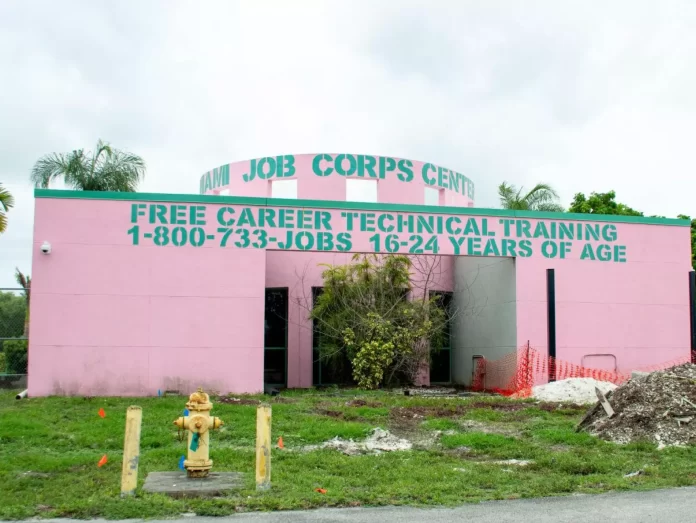
|
Getting your Trinity Audio player ready...
|
The Miami Job Corps Center, a lifeline for hundreds of South Florida’s at-risk youth, is abruptly shutting down, leaving students scrambling for housing and staff blindsided by sudden unemployment.
The U.S. Department of Labor (DOL) announced late last month that the federally funded program would be “paused” nationwide,citingbudget shortfalls and a shift in priorities under the Trump administration’s proposed 2026 budget. The program reportedly operated at a $140 million deficit in 2024 and is projected to face a $213 million shortfall this year.
“Job Corps was created to help young adults build a pathway to a better life through education, training, and community,” said Labor Secretary Lori Chavez-DeRemer in the statement. “However, a startling number of serious incident reports and our in-depth fiscal analysis reveal the program is no longer achieving the intended outcomes that students deserve.”
However, for the 300 students and 115 employees at the Miami location, the closure feels more like abandonment.
Bernard Johnson, director of the Miami Job Corps Center, said the notice sent to Adams and Associates — the contractor managing the site — cited termination “for the convenience of the government.”
“All operations were to shut down by June 30. We were told to begin transporting students out by June 6,” Johnson said. “You could see the despair and the confusion on a lot of students’ and staff’s faces. It wasn’t easy to explain to them that their way of thinking and the progress they have made was coming to an end abruptly.”
A legal pause
Last week, U.S. District Judge Andrew Carter in Manhattan, N.Y., issued a temporary restraining order following a lawsuit filed by a trade group representing Job Corps contractors. The suit alleges the DOL violated federal law by abruptly shuttering the program.
The ruling temporarily blocks the DOL from terminating contracts or halting operations until a June 17 hearing. Students can remain on campus, but their futures remain uncertain.
“If we win the legal battle, then we’ll have a court case,” Johnson explained. “If we don’t, it goes back to the June 30 date.”
Launched in 1964 under President Lyndon B. Johnson’s Great Society, Job Corps offers free housing, education, vocational training and job placement services to low-income youth ages 16 to 24.
It provides hands-on training in trades like glazing, carpentry, painting, culinary arts and office administration, as well as off-campus partnerships for certified nursing assistant and IT tracks. Students can also get their high school diploma or equivalent, learn English, receive tutoring, and pursue advanced career training in fields like emergency medical technology through Miami Dade College, all while continuing to live on campus.
Currently, 170 students live on-site while 130 are non-residential. The center also has a waitlist of 200 students whose applications are now paused.
“It’s preventing us from helping these youth who came here to move forward with their life and gain a trade skill so they can move into the profession of their choice,” Johnson said.
A lifeline for many
For 19-year-old student Ciara Piere, who experienced homelessness before entering Job Corps, the program provided a sense of stability.
“When I first heard about the closure, I was insanely sad,” she said. “Mostly because myself and some of my friends here have experienced homelessness. Where are we gonna go? Where are we gonna live at?”
Piere, who is studying office administration and emergency medical services, said the program has helped her grow both personally and professionally.
“By teaching responsibility, not only for advocating for myself — because I have a hard time doing that — but also advocating for other people,” she said.
She’s launched a petition to save Job Corps, which has gathered more than 600 signatures.
Her backup plan?
“I plan to see if I have any friends to fall back on to be like, ‘Do you have any housing you can get me?’ See if there is possibly a shelter or half a house that I can go to,” Piere said.
Although students can remain on campus for now, the fear of closure looms.
“We’ll have to find housing for about 10 to 15% of our students who have nowhere to go, and then there’s probably another 10 or 15% for whom the housing we’re providing is better than the housing they’re currently in,” Johnson said.
A safety net in jeopardy
In addition to students, 115 staff members are facing job loss.
Victor Covington, 24, knows what it’s like to go from surviving to thriving. A Job Corps graduate who trained building construction technology in Miami and advanced electrical in Utah, he recently returned as the center’s safety officer, a role he’d barely begun when the shutdown was announced.
“My journey from student to staff member wasn’t rocky, but it was a lot of growth,” he said. “This place taught me how to be independent and show up for myself.”
Covington said his desire to return wasn’t just about a paycheck; it was about paying it forward.
“A lot of students ask me, ‘Why’d you come back?’ I didn’t come back just for compensation. It’s somewhere for me to grow and to help other kids grow.”
But two days into the job, the news hit.
“We had our managers meeting and Mr. Johnson told us, straight up, that the Department of Labor was terminating Job Corps,” he said. “I couldn’t even start my 401(k), no benefits yet, nothing.”
Michael Fisher, the standards and incentive officer who has worked at Miami Job Corps for 14 years, said the announcement hit him hard.
“It’s tough. I have a newborn child, and possibly not having work is very impactful on me and my family right now,” Fisher said. “It’s bigger than me. Thousands of people would be out of a job, and thousands of students would be displaced.”
Fisher said watching young people transformed by the program has been the most rewarding part of his job.
“You actually see the ending results,” he said. “You see people who came here with nothing and left here living on their own and being a tax credit to this society.”
Beyond personal impacts, Johnson said the closure would ripple across the local economy.
“A lot of the money that we have to spend on the outside, resources that we need for Job Corps, we do it with local businesses,” Johnson said. “We have a 70% rate where we’re doing small business in the local community. So that funding is not gonna be there anymore.”
A call to action
Nationwide, Job Corps centers are fighting to stay open. The program currently serves about 25,000 students across 120 locations.
Asked what he’d say to the Department of Labor if given the chance, Fisher was clear:
“They should understand the culture this program has. It helps build this country from the bottom up. There’s a big gain if we keep this program.”
Congresswoman Frederica Wilson has also joined the push, posting on social media:
“Wake up, America! Try to understand the power of prevention and how it keeps our families safe! Job Corps is prevention 101! Call your congressperson now and demand ‘Hand off Job Corps!’”
This story was produced by The Miami Times, one of the oldest Black-owned newspapers in the country, as part of a content sharing partnership with the WLRN newsroom. Read more at miamitimesonline.com.
This story was originally produced by WLRN, South Florida’s only public radio station at 91.3 FM, as part of a content sharing partnership with Miami’s Community News. Read more at WLRN.org.
ABOUT US:
For more Miami community news, look no further than Miami Community Newspapers. This Miami online group of newspapers covers a variety of topics about the local community and beyond. Miami’s Community Newspapers offers daily news, online resources, podcasts and other multimedia content to keep readers informed. With topics ranging from local news to community events, Miami’s Community Newspapers is the ideal source for staying up to date with the latest news and happenings in the area.
This family-owned media company publishes more than a dozen neighborhood publications, magazines, special sections on their websites, newsletters, as well as distributing them in print throughout Miami Dade County from Aventura, Sunny Isles Beach, Miami Beach, Coral Gables, Brickell, Coconut Grove, Pinecrest, South Miami, Kendall, Palmetto Bay, Cutler Bay and Homestead. Each online publication and print editions provide comprehensive coverage of local news, events, business updates, lifestyle features, and local initiatives within its respective community.
Additionally, the newspaper has exclusive Miami community podcasts, providing listeners with an in-depth look into Miami’s culture. Whether you’re looking for local Miami news, or podcasts, Miami’s Community Newspapers has you covered. For more information, be sure to check out: https://communitynewspapers.com.
If you have any questions, feel free to email Michael@communitynewspapers.com or Grant@communitynewspapers.com
#thatscommunitynews #communitynewspapers #miamidade #miamidadecounty #thatscommunity #miamicommunitynews #coralgables #palmettobay #southmiami #doral #aventura #pinecrest #kendall #broward #biscaynebay





